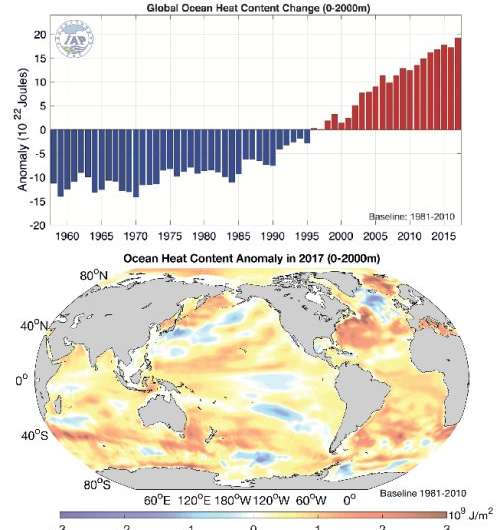Credit: Chinese Academy of Sciences
2017 was the warmest year on record for the global ocean, according to an updated ocean analysis from Institute of Atmospheric Physics/Chinese Academy of Science (IAP/CAS).
The oceans in the upper 2000 meters were 1.51 × 1022 J warmer than the second warmest year of 2015, and 19.19 × 1022 J above the 1981-2010 climatological reference period. Owing to its high heat capacity, the ocean accumulates heat energy derived from human activities; indeed, more than 90 percent of Earth's residual heat related to global warming is absorbed by the ocean. As such, the global ocean heat content record robustly represents the signature of global warming, and is impacted less by weather-related noise and climate variability such as El Niño and La Niña events. According to IAP ocean analysis, the last five years have been the five warmest years in the ocean. Therefore, the long-term warming trend driven by human activities continued unabated.
The increase in ocean heat content for 2017 occurred in most regions of the world (Figure). The human greenhouse gas footprint continues to impact the Earth system. Increases in ocean temperature cause ocean volume expansion, which contributes to the global mean sea level rise. The increase in ocean heat of 1.51 × 1022 J in 2017 resulted in a 1.7 mm sea global level rise. Other consequences include declining ocean oxygen, bleaching of coral reefs, and melting sea ice and ice shelves.
More information: Cheng, L., and J. Zhu, 2018: 2017 was the warmest year on record for the global ocean. Adv. Atmos. Sci., 35(3), DOI: 10.1007/s00376-018-8011-z
Provided by Chinese Academy of Sciences























